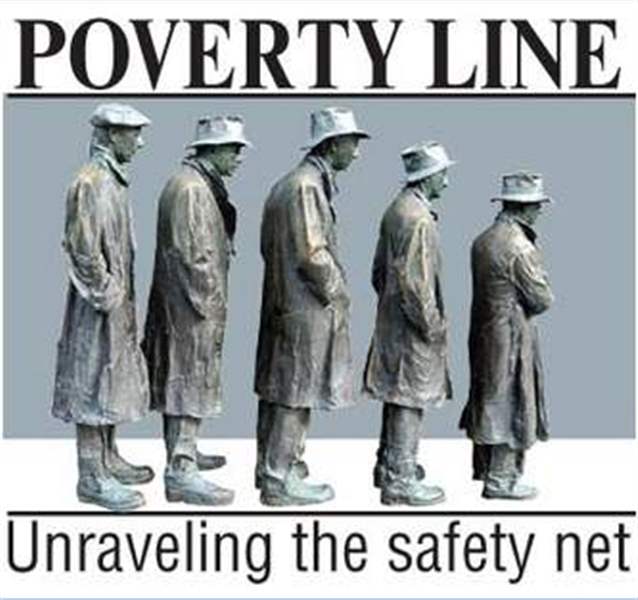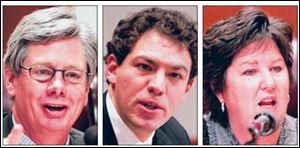
POVERTY LINE
3 Lucas County agency chiefs get raises despite economic crisis
Timing of officials’ pay hikes draws ire of commissioners
3/8/2009

With the national economy battering the Toledo area, The Blade this year will examine poverty and the region’s readiness for the turmoil caused as more people lose their jobs. Today, we look at the pay raises given to the heads of local government agencies who serve the most vulnerable among the poor.
As Lucas County prepares to slash staff and freeze wages, the leaders of three agencies that assist many of the county's most at-risk residents are enjoying pay raises.
Amid the worst economic downturn this region has endured in a generation, the county's Board of Mental Retardation and Development Disabilities, the Children Services Board, and the Mental Health and Recovery Services Board have approved pay increases for their top officials, sending their six-figure salaries even higher.
A Blade analysis has found that after a $5,000 pay increase in December, Dean Sparks, the executive director of children services, is on pace to make nearly $167,000 in total compensation this year, including his base salary, insurance, retirement contributions, and a car and parking allowance that tops $800 per month.
Likewise, Jacqueline Martin, the executive director of the mental health board, accepted a 3 percent pay increase in January, pushing her total compensation for 2009 to an estimated $145,000, including benefits.
And John Trunk, the superintendent of MRDD, began collecting a 3 percent raise in July, moving his total compensation for 2009 to more than $166,000, including benefits such as a $600-per-month car allowance.
All three - who successfully petitioned voters for levy increases for their agencies last year - were among the highest-paid county employees before their pay increases. The pay increases mean that management staff and other employees are also in line for raises at a time when wage freezes for government officials - from Congress to local leaders - are en vogue.
READ MORE: Poverty Line -- Unraveling the safety net
Lucas County Commissioners Pete Gerken, Tina Skeldon Wozniak, and Ben Konop said they were outraged by the timing of the raises, contending it shows disregard for the financial constraints facing not only the county government, but many county residents falling into poverty.
"It is not proper to give these raises in a time when we are laying off workers and we are having across-the-board pay freezes for average workers," Mr. Konop said. "Prior to these raises, they were being compensated generously. For these boards, they owe it to the community to put it back with the people who need their services - not for executive compensation that in my mind is over the top."
In a yearlong series, The Blade is examining the agencies and organizations that are responsible for helping our region's most vulnerable people - the poor, the unemployed, children, and the disabled - looking at whether the region is prepared to handle the growing numbers of people who will need assistance as the economy worsens.

Last month, The Blade reported that more than $800 million is spent in Lucas County by the federal and state governments on benefits and programs for low-income residents. The heads of government agencies and nonprofit organizations working with the poor say they have grave fears about the region's readiness to help the 18,000 Toledo-area residents set to lose their unemployment benefits later this year.
The jobless rate in Toledo increased in January to 14.3 percent, the highest level in nearly 18 years, and in Lucas County to 13.3 percent, the highest level in almost 26 years.
Mr. Sparks said in an interview with The Blade last week that he's given a great deal of thought to the appropriateness of the pay increase he accepted in December - saying that he's decided to ask his board to suspend his increase and roll back his salary by about $400 per month.
"I'm not embarrassed about my salary, but I'm cognizant of what other families are going through, so I want to make sure that every dollar possible is made available to serve kids and families," said Mr. Sparks, who in 1997 became executive director of Children Services, a 400-employee agency with an annual budget of $47 million.
Most of the children his agency serves are in the ranks of the county's growing population of the poor, with the agency itself saying the vast majority comes from families that are the poorest of the poor.
Mr. Sparks said his pay is less than what directors of similar agencies across the state receive, and he noted that he's been contacted by Butler and Summit counties about jobs.
"I'd like as much as I can get when I negotiate my pay, but I understand the situation," said Mr. Sparks.
Commissioner Tina Skeldon Wozniak said she's urged the directors not to accept the increases.
"These are horrific times in our economy, and we are trying to deliver services to people who have lost jobs and homes are being foreclosed," Ms. Wozniak said. "With this kind of situation at hand, this isn't the time to take big raises and to have large car allowances."

Commissioners Pete Gerken, left, Ben Konop, and Tina Skeldon Wozniak say the raises show disregard for the many county residents falling into poverty.
Mr. Gerken, the president of the Lucas County commissioners, said he is disappointed that money derived from the November ballot measures approved by voters is being used for executive pay increases in the children services and mental health agencies. The commissioners voted to place the levies - which cost an owner of $100,000 home $170 per year, an increase of $50 from the previous year - on the November ballot.
"I was dismayed and even a bit angered when I found out that, through no public declaration, that there were significant raises to the two executive directors at a time when the people ponied up to put services in play, not to put money in people's pockets," Mr. Gerken said. The mental retardation board already had approved Mr. Trunk's pay increase before last year's levy issue.
"I think every voter knows that people get routine pay raises and that's part of what the tax dollars go for," said David Schlaudecker, the vice chairman of the mental health board. "We can't have the quality of staff we need if we don't pay them fairly and equitably."
Ms. Martin, who manages the 20-employee agency with a budget of $63 million, declined comment, referring questions to her board instead. The agency has scaled back its staff in recent months, issuing at least one layoff notice and not replacing others who have left for other positions.
Despite political pressure, Mr. Schlaudecker said Ms. Martin's pay raise would not be rolled back, but that the board would not increase her salary this year.
"We are looking ahead," Mr. Schlaudecker said. "I can't speak for every board member, but we haven't heard any who have expressed any regrets [about the pay increase]."
Mr. Gerken said he's been lobbying quietly behind the scenes to convince the directors and their boards to rescind the pay increases they received. He said he was disappointed by the mental health board's failure to roll back Ms. Martin's salary, but he applauded Mr. Sparks for taking that step.
Mr. Gerken is still waiting on Mr. Trunk.
When his pay increase was approved last summer, Mr. Trunk said the economy looked much different than it looks today - and a different decision might have been made under these circumstances.
"I understand and certainly appreciate the climate that we are in," said Mr. Trunk, who runs a 724-employee agency with a budget of $78 million. "It is awful and it is unprecedented The increases were given in July. Back in May and June of 2008, gosh, who would have seen this coming?"
Mr. Trunk said his board is discussing raises and increases and the "unprecedented financial times we are in and our need to respond."
"We've already had conversations within our board about evaluating the need for increases and the climate for increases this year," Mr. Trunk said. But he also said he doesn't feel his salary is out of line.
"I work hard," Mr. Trunk said. "I feel like I bring value to this job, to the board of MRDD system. We, as a board, have always watched our dollars carefully."
Contact Steve Eder at:
seder@theblade.com or
419-304-1680.